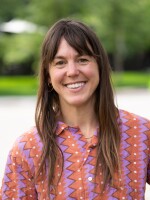Rabbi Shira Stutman is the new full-time rabbi of the Aspen Jewish Congregation. She took the position in June having served as interim rabbi for two years, commuting from Washington, D.C.
Rabbi Stutman leads a congregation whose membership spans the Roaring Fork Valley, from Aspen to Glenwood Springs. Her services often take place in non-traditional settings, at a riverside camp, or more recently, at the top of Aspen Mountain. She describes the congregation as a “synagogue without walls.”
Aspen Public Radio reporter Sarah Tory spoke with Rabbi Stutman about what drew her to the valley, the promise and peril of religious communities, and how she’s helping her congregation navigate tumultuous times.
The conversation below has been edited for clarity and length.
Sarah Tory: What was the draw for you in leading the congregation here?
Rabbi Shira Stutman: I just fell in love with the community. I mean the people who live here in the Roaring Fork Valley, I guess I don't need to tell you this, but the people who live here are just — they're an unusual bunch, especially for a group of Jews.
I have never — I'm 52 years old — I've never lived outside a city in my life.
People here are, they are spiritually yearning. They might not articulate it that way. They might say, “I love to ski, I love to hike. I love to be in the outdoors.” But to me, the idea of taking a hike in the mountains is a type of spiritual connectivity. Because you are not only pushing your own body to its limits, but you are trying to connect with all that is greater than you in the universe. And so, once I got out here and met the people who have chosen to live here, I was sort of done for. I couldn't go back to the big city.
Tory: What does the practice of Judaism offer in a society that's, in many places, moving away from religion?
Rabbi Stutman: My pitch is: There are so many people struggling with loneliness, most especially people in their 20s and early 30s, which I think is surprising to a lot of people. You know, one antidote to that is the religious community. It is the church, it is the synagogue, or the mosque.
And so, yes, I know there is sometimes corruption, and I know that there is hypocrisy, trust me, I know all the things that can go wrong in a religious community, but at the end of the day, when you find the right spiritual community, there is no other type of group that can hold you when you're broken and that can celebrate you when you are in a moment of pure joy.
Tory: How do you reconcile that? In terms of the positivity it provides for so many people and also the damage it can do?
Rabbi Stutman: I actually am really glad you asked that question, and I hope even if you don’t put the question on there, maybe you can put some of the answer. Because I do think that anytime that any religion veers into fundamentalism — as in, there's only one answer, and our community has that answer and everyone on the outside has the wrong answer, then we've got a problem. And we can see the type of damage that it leads to.
Tory: What role do you see for yourself as a rabbi in helping your congregation navigate larger geopolitical issues like the Israel-Gaza War?
Rabbi Stutman: I work very hard not to take policy positions from the pulpit, because I don't think that would serve our community. Instead, what I try to do is meet all of our congregants where they are, and mourn with them where they are, because the truth is, whoever you are, if you are someone who cares about the Israel-Gaza war, you are in deep mourning. Mourn with them where they are and walk with them where they are.
Tory: What about when it comes to antisemitism?
Rabbi Stutman: So when we're talking about rising antisemitism, we're talking about two things at the same time. The first thing we're talking about is the significant rise in antisemitism that really started under President Obama and has skyrocketed in the last few years.
There have been swastikas a number of times at almost all of the schools in the Roaring Fork Valley. So, antisemitism can be big, but it also can be a lot of really, really small moments that lead to Jews feeling unsafe.
So that's part one. Part two is actually the inherited Jewish trauma that a lot of Jews have, that leads us to really feel that antisemitism is everywhere around us. And that is part of my work as a rabbi — to help us differentiate between actual antisemitism, which is increasing significantly, and the traumatic reaction to that antisemitism, which every once in a while can be out of whack.
Tory: What are you looking forward to building with the Aspen congregation in the future?
Rabbi Stutman: I’m so excited about the next few years with this congregation, because we have the opportunity to grow both inward and outward. Meaning, we have the opportunity to grow in the way that we take care of our congregation, the way we show up for people when they're sick or when there's a new baby or when someone has passed away. And then we have the opportunity to show up in our community, the larger Jewish community of the Roaring Fork Valley, but also the larger Roaring Fork Valley community as well.



